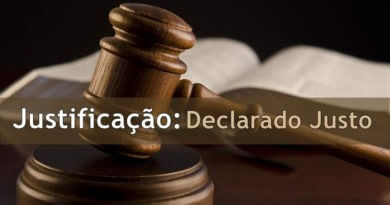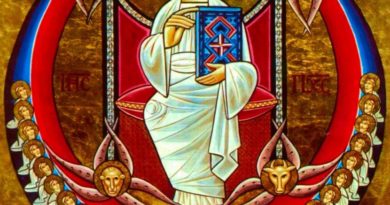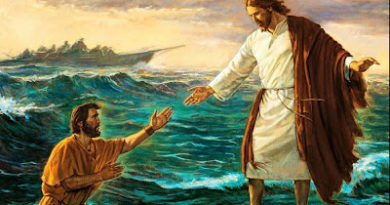A missa e o sacrifício de Cristo
Translation by David Brito
In Roman Catholicism the Mass is equivalent to the Lord’s Supper, the offering of communion. The word mass is derived from Latin. The Mass is a series of rituals centered around the Communion Supper. It is also called the Eucharistic Supper. According to the New St. Joseph Catechism of Baltimore, vol. 2, question 357, “The Mass is the sacrifice of the new law in which Christ, through the ministry of the priest, offers himself to God in an unbloody way under the species of bread and wine. The Mass is the sacrifice of Christ, offered in a sacramental way… the reality is the same, but the appearances are different.
“Question 358 says, “What is a sacrifice?”
The answer given is “ A sacrifice is the offering of a victim offered to God by a priest, and the destruction of that somehow for the knowledge that he is the creator of all things .” From the Baltimore Catechism, we can conclude that the Mass is Christ’s offering through a priest.
According to Roman Catholicism, Christ instituted the Mass when he said, “This is my body” (Mt. 26:26) and “This is my blood” ( Mt. 26:28 ). Furthermore, Roman Catholicism teaches that when Jesus said:
“ Do this in remembrance of me ,” he gave the apostles and therefore their future priests the power to change bread and wine into Body and Blood, (Baltimore Catechism, Vol. 2, Q. 354). Therefore, during the ceremony of the Mass, during the part of the liturgy known as the consecration. The priest changes the bread and wine into the body and blood of Christ (Catechism of the Catholic Church, 1105).
As we look at the Catechism of the Catholic Church (CCC), The Catholic Encyclopedia, and The Council of Trent, we find the Eucharist explained in a few ways;
“ The Holy Sacrifice of the Eucharist” (CCC, 1055) and “The Eucharist is also a sacrifice ” (CCC, 1365).
“ For it is in the liturgy, especially in the divine sacrifice of the Eucharist, that “the work of our redemption is accomplished ” (CCC, 1068).
As a representation of Christ’s sacrifice
“The Eucharist is, therefore, a sacrifice because it represents (makes present) the sacrifice of the cross,” (CCC, 1366).
It’s a single sacrifice with Christ’s sacrifice
“The sacrifice of Christ and the sacrifice of the Eucharist are one sacrifice,” (CCC, 1367).
It’s the same sacrifice of Christ
“And because in this divine sacrifice that takes place in the Mass, this same Christ, who offered himself once in a bloody way on the altar of the cross, is contained and is immolated in an unbloody way, this sacrifice is truly propitiatory” (CCC, 1367).
It is propitiatory (removes the wrath of God)
“… this sacrifice is truly propitiatory ,” (CCC, 1367).
To all who deny its propitiatory nature be anathema
“If anyone says that the sacrifice of the Mass is only a sacrifice of praise and thanksgiving; or, that it is a simple commemoration of the sacrifice consummated on the cross, but not a propitiatory sacrifice; or, that he benefits only he who receives; and that it should not be offered to the living and to the dead for sins, pains, satisfactions, and other wants; be anathema.” (Trento: On the Sacrifice of the Mass: Canon 3)
It is called the sacrifice of Christ, which is offered by the hands of the priest .
“in union with the sacrifice of Christ, the only mediator, offered in the name of the whole Church in the Eucharist by the hands of the priests, in a bloodless and sacramental way until the Lord himself comes” (CCC, 1369).
He is able to make reparation for sins
“As a sacrifice, the Eucharist is also offered in reparation for the sins of the living and the dead, and to obtain spiritual or temporal benefits from God” (CCC, 1414).
It is to be considered the true sacrifice itself
“The Church intends that the Mass be regarded as a “proper and true sacrifice” (The Catholic Encyclopedia, topic: “Sacrifice of the Mass”).
Is the Mass a re-sacrifice of Christ?
Roman Catholics are quick to say that the Eucharist is not a re-sacrifice of Christ. They want to make it clear that Christ was offered once for all and that the Mass is not a re-sacrifice, but a “re-presentation” of the sacrifice. We certainly do not want to misrepresent Roman Catholic theology, but we have to ask how it is possible for the Mass not to be a re-sacrifice of Christ, when the Mass is called a divine sacrifice ( CCC , 1068) that is done over and over again. We are told that “the sacrifice of Christ and the sacrifice of the Eucharist are one sacrifice”, ( CCC , 1367), which is a bloodless and propitiatory offering ( CCC , 1367), which can make reparation for sins, ( CCC , 1367)., 1414), The Church intends that the Mass be regarded as a “proper and true sacrifice” (The Catholic Encyclopedia, topic: “Sacrifice of the Mass”). We must conclude that it is a sacrifice that occurs over and over again, and since it is said to be a true and proper sacrifice that is propitiatory, then logically it must be a re-sacrifice of Christ. If not, then how can it be called the sacrifice of Christ? Furthermore, how could it be propitiatory, if it is not a sacrifice of Christ, for it is Christ’s offering on the cross that is the propitiation itself?
- “Wherefore in all things he ought to be made like his brethren, that he might become a merciful and faithful high priest in things pertaining to God, to make propitiation for the sins of the people” (Heb. 2:17).
- “And he is the propitiation for our sins, and not for ours only, but also for the whole world” ( 1 John 2:2 ).
Biblical Answer
Normally, the Roman Catholic Church will say that the Mass is not a re-sacrifice. But it’s hard to conclude otherwise when we look at what official Roman Catholic documents say. So we assume that if someone walks like a duck and quacks like a duck, and looks like a duck, it must be a duck. Likewise, if the Mass is said to be a sacrifice of Christ and is repeated, then we must conclude that it is a continual sacrifice, a re-sacrifice of Christ since the Catholic Church says that this sacrifice is propitiatory (removes the wrath of God). ), and it is only the sacrifice of Jesus that can actually perform the propitiation.
The Bible has a lot to say about Christ’s sacrifice. Please consider the following verses:
Sacrifice offered once
“Surely we needed a priest like this: holy, blameless, pure, separated from sinners, exalted above the heavens. Unlike other high priests, He does not need to offer sacrifices day after day ; who offer first for their own sins, and then only for the sins of the people. Because the moment he offered himself, he performed that sacrifice once and for all” (Heb. 7:26-27 ).
“ So also Christ, having been offered once to bear the sins of many , will appear the second time, without sin, to those who are waiting for him for salvation” ( Heb. 9:28 ).
” And by that determination, we were sanctified through the once-for-all offering of the body of Jesus Christ . Now every priest presents himself, day after day, to perform his religious duties, which can never take away sins. But Jesus, having offered one sacrifice for sins forever , sat down at the right hand of God” ( Heb. 10:10-12 ).
Repetition of the sacrifice without any value.
“For the law, having a shadow of good things to come, and not the exact image of the things, can never, by the sacrifices that are offered year after year continually, perfect those who come to God” ( Heb. 10: 1 ).
“Now every priest presents himself day after day, ministering and often offering the same sacrifices, which can never take away sins” ( Heb. 10:11 ).
We can see that the Bible clearly tells us that Christ offered himself once and that there is no need for a repetition of his sacrifice. The Roman Catholic Church has distorted the biblical doctrine of the Lord’s Supper into a constant and repetitive sacrifice of Christ. It should be clear to the reader that the Roman Catholic position is not only scriptural, but unbiblical.
We at CARM humbly request that the Roman Catholic Church not place its faith in the Mass, but instead turn to the one true sacrifice of Christ by faith and that they place their hopes only in Jesus and not in a human institution that offers a repetitive sacrifice. We were justified by the blood of Christ and not by the offering of a Roman Catholic priest who changes the bread and wine into the literal body and blood of Christ.
- “If we confess our sins, He is faithful and just to forgive us all our sins and to cleanse us from all unrighteousness” ( 1 John 1:9 ).
- “Now, as we have been justified by his blood, so much more, through him, shall we be saved from the wrath of God!” ( Rom. 5:9 ).
- “Therefore, having been justified by faith, we have peace with God through our Lord Jesus Christ” ( Rom. 5:1 ).




